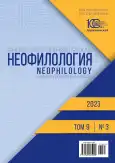Nomination of society and sociomorphic code of nomination: correlation of concepts
- Authors: Wang H.1
-
Affiliations:
- Volgograd State Socio-Pedagogical University
- Issue: Vol 9, No 3 (2023)
- Pages: 509-518
- Section: RUSSIAN LANGUAGE. LANGUAGES OF PEOPLES OF RUSSIA
- URL: https://journal-vniispk.ru/2587-6953/article/view/295726
- DOI: https://doi.org/10.20310/2587-6953-2023-9-3-509-518
- ID: 295726
Cite item
Full Text
Abstract
The subject of consideration is the nomination of society as a central fragment of the Russian language picture of the world and a sociomorphic language code based on comparison with society. The relevance of the study lies in the study of the ratio of means of secondary indirect nomination to designate society (sotsial‟nyi lift) and the use of primary and secondary direct nomination of society to designate other fragments of the Russian language picture of the world (postavki oruzhiya “kapel‟nym polivom”). The material of the press and oral talk-shows of experts (1160 examples) was analyzed. The methods of component analysis and the comparative method were used. The results of the study show the nominative activity of the Russian linguistic personality in the formal and informal nomination of society: the use of landscape (bol‟shaya luzha), climatic (stoyat‟ na raz”ezzhayushchikhsya l‟dinakh), zoomorphic (giena Evropy), artifact (beskonechnyi dollar), historiomorphic (sharovarnyi Vermakht) metaphors; manifestation of the systemic organization of society‟s nominations: synonymic series (rzhavyi Tolik, gospodin privatizais ryzhii vaucher Chubais; likhie – banditskie – pomoinye devyanostye), antonymic pairs (zastoi – nezhnyi Brezhnev), homonymous pairs (krasnaya Armiya „workers‟-and-peasants‟ army of the country of Soviets‟ – krasnaya armiya „association of terrorist brigades of Italy‟), thematic groups (time periods, leaders of states, professions, places of settlement, etc.); the appearance in this nominative field of historicisms (khrushchevskaya ottepel‟, chlenovoz) and archaisms (okolotochnyi – uchastkovyi). The main functions of the informal nomination of society (epistemological, characterizing, adaptive, philosophical) are established. The results of the work can be used in linguistics, journalism, sociology, political science.
Keywords
About the authors
Han Wang
Volgograd State Socio-Pedagogical University
Author for correspondence.
Email: 673278805@qq.com
ORCID iD: 0000-0002-3816-4858
Post-Graduate Student, Russian Language and Methods of Teaching Department
27 Lenin Ave., Volgograd, 40005, Russian FederationReferences
- Shestak L.A. Russkaya yazykovaya lichnost’: kody obraznoi verbalizatsii tezaurusa [Russian Linguistic Perso-nality: Thesaurus Figurative Verbalization Codes]. Volgograd, Peremena Publ., 2003, 311 p. (In Russ.) https://elibrary.ru/qqsayf
- Brusenskaya L.A., Kulikova E.G. Animalistic metaphor in the modern political media discourse. Vestnik Moskovskogo universiteta. Seriya 10: Zhurnalistika = Bulletin of Moscow University. Series 10: Journalism, 2022, no. 6, pp. 87-108. (In Russ.) https://doi.org/10.30547/vestnik.journ.6.2022.87108, https://elibrary.ru/lqjdyd
- Yurina E.A. Obraznyi stroi yazyka [The Figurative Structure of the Language]. Tomsk, Tomsk State University Publ., 2005, 156 p. (In Russ.) https://elibrary.ru/rydoor
- Kim I.E. Sotsial’naya sfera v russkoi yazykovoi kartine mira [The social sphere in the Russian language picture of the world]. Vlast’ v russkoi yazykovoi i etnicheskoi kartine mira [Power in the Russian Linguistic and Ethnic Picture of the World]. Moscow, Znak Publ., 2004, pp. 89-154. (In Russ.) https://elibrary.ru/twfzkx
- Erofeeva T.I. The lexeme “POLITICS”: semantic analysis of dictionary definitions in the Russian language. Politicheskaya lingvistika = Political Linguistics, 2022, no. 4 (94), pp. 109-114. (In Russ.) https://elibrary.ru/mijnyi
- Shmelev D.N. (executive ed.). Sposoby nominatsii v sovremennom russkom yazyke [Methods of Nomination in Modern Russian]. Moscow, Nauka Publ., 1982, 295 p. (In Russ.) https://elibrary.ru/rswtdp
- Teliya V.N. Vtorichnaya nominatsiya i ee vidy [Secondary nomination and its types] Yazykovaya nominatsiya (vidy naimenovanii) [Language Nomination (Types of Names)]. Moscow, Nauka Publ., 1977, pp. 129-221. (In Russ.) Available at: https://klex.ru/nee
- Ogol’tsev V.M. Ustoichivye sravneniya v sisteme russkoi frazeologii [Stable Comparisons in the System of Rus-sian Phraseology]. Leningrad, Leningrad State University Publ., 1978, 159 p. (In Russ.)
- Ilyukhina N.A. Obraz v leksiko-semanticheskom aspekte [Image in the Lexico-Semantic Aspect]. Samara, Samara State University Publ., 1998, 204 p. (In Russ.) https://elibrary.ru/tmotfz
- Pavlovich N.V. Yazyk obrazov. Paradigmy obrazov v russkom poeticheskom yazyke [Image Language. Para-digms of Images in Russian Poetic Language]. Moscow, Azbukovnik Publ., 2004, 527 p. (In Russ.)
- Shchagina O.V. A corpus study of English “nautical” idioms. Neofilologiya = Neophilology, 2021, vol. 7, no. 28, pp. 636-644. (In Russ.) https://doi.org/10.20310/2587-6953-2021-7-28-636-644, https://elibrary.ru/zhruhv
- Chudinov A.P., Budaev E.V., Solopova O.A. Politicheskaya metaforologiya: Diskursivnyi povorot [Political Metaphorology: the Discursive Turn]. Moscow, Flinta Publ., 2020. 234 p. (In Russ.) https://elibrary.ru/gugoyk
- Gus’kova S.V. Polemical nature of political discourse in the regional internet space. Neofilologiya = Neophilol-ogy, 2022, vol. 8, no. 2, pp. 358-368. (In Russ.) https://doi.org/10.20310/2587-6953-2022-8-2-358-368, https://elibrary.ru/jklvbs
- Bonch-Osmolovskaya A.A. Imena vremeni: epitety desyatiletii v Natsio-nal’nom korpuse russkogo yazyka kak proektsiya kul’turnoi pamyati [Names of time: epithets of decades in the National corpus of the Russian lan-guage as a projection of cultural memory]. Shagi = Steps, 2018, vol. 4, no. 3-4, pp. 115-146. (In Russ.) https://doi.org/10.22394/2412-9410-2018-4-3-115-146, https://elibrary.ru/vkpodo
- Simonyan R. «Likhie» ili «slavnye» devyanostye? [“Dashing” or “glorious” nineties?]. Svobodnaya mysl’ [Free Thought], 2011, no. 12 (1630), pp. 159-174. (In Russ.) https://elibrary.ru/twquwp
- Chzhan T. Two decades images in the political discourse of the russian media: the dashing 1990s vs. the stable 2000s. Politicheskaya lingvistika = Political Linguistics, 2022, no. 2 (92), pp. 205-211. (In Russ.) https://elibrary.ru/znysqb
- Mishchenko A.N., Nakhimova E.A., Segal N.A. Linguistic realization of the euphemism “polite people” in the electronic media of Russia, Ukraine and Belarus. Politicheskaya lingvistika = Political Linguistics, 2022, no. 2 (92), pp. 129-137. (In Russ.) https://elibrary.ru/ayanys
- Livei Chzhan. Perception of Russia’s image in china in the context of “One belt and one road”. Neofilologiya = Neophilology, 2021, vol. 7, no. 25, pp. 180-185. (In Russ.) https://doi.org/10.20310/2587-6953-2021-7-25-180-185, https://elibrary.ru/hicisi
- Zhanturina B.N., Znak Yu.E., Novikova Z.A. Syncretism of meanings in the political color metaphor krasnye linii – red lines. Politicheskaya lingvistika = Political Linguistics, 2022, no. 5 (95), pp. 192-198. (In Russ.) https://doi.org/10.26170/1999-2629_2022_05_20, https://elibrary.ru/vvgepl
Supplementary files









